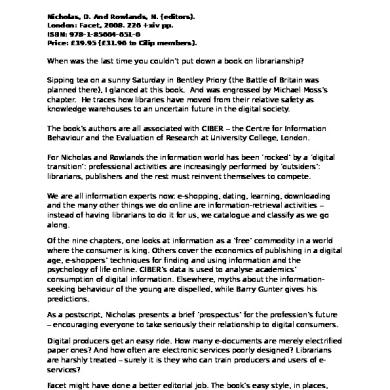Surviving The Future
This document was uploaded by user and they confirmed that they have the permission to share it. If you are author or own the copyright of this book, please report to us by using this DMCA report form. Report DMCA
Overview
Download & View Surviving The Future as PDF for free.
More details
- Words: 362
- Pages: 2
SURVIVING THE FUTURE Nicholas, D. And Rowlands, N. (editors). London: Facet, 2008. 226 +xiv pp. ISBN: 978-1-85604-651-0 Price: £39.95 (£31.96 to Cilip members).
When was the last time you couldn’t put down a book on librarianship? Sipping tea on a sunny Saturday in Bentley Priory (the Battle of Britain was planned there), I glanced at this book. And was engrossed by Michael Moss’s chapter. He traces how libraries have moved from their relative safety as knowledge warehouses to an uncertain future in the digital society. The book’s authors are all associated with CIBER – the Centre for Information Behaviour and the Evaluation of Research at University College, London. For Nicholas and Rowlands the information world has been ‘rocked’ by a ‘digital transition’: professional activities are increasingly performed by ‘outsiders’: librarians, publishers and the rest must reinvent themselves to compete. We are all information experts now: e-shopping, dating, learning, downloading and the many other things we do online are information-retrieval activities – instead of having librarians to do it for us, we catalogue and classify as we go along. Of the nine chapters, one looks at information as a ‘free’ commodity in a world where the consumer is king. Others cover the economics of publishing in a digital age, e-shoppers’ techniques for finding and using information and the psychology of life online. CIBER’s data is used to analyse academics’ consumption of digital information. Elsewhere, myths about the informationseeking behaviour of the young are dispelled, while Barry Gunter gives his predictions. As a postscript, Nicholas presents a brief ‘prospectus’ for the profession’s future – encouraging everyone to take seriously their relationship to digital consumers. Digital producers get an easy ride. How many e-documents are merely electrified paper ones? And how often are electronic services poorly designed? Librarians are harshly treated – surely it is they who can train producers and users of eservices? Facet might have done a better editorial job. The book’s easy style, in places, reads like an unedited informal talk; one chapter’s two opening sentences have 110 words. Also, the price is steep for a book with a wide potential market. But it’s still an excellent read!
Ralph Adam, Sept. 2008
When was the last time you couldn’t put down a book on librarianship? Sipping tea on a sunny Saturday in Bentley Priory (the Battle of Britain was planned there), I glanced at this book. And was engrossed by Michael Moss’s chapter. He traces how libraries have moved from their relative safety as knowledge warehouses to an uncertain future in the digital society. The book’s authors are all associated with CIBER – the Centre for Information Behaviour and the Evaluation of Research at University College, London. For Nicholas and Rowlands the information world has been ‘rocked’ by a ‘digital transition’: professional activities are increasingly performed by ‘outsiders’: librarians, publishers and the rest must reinvent themselves to compete. We are all information experts now: e-shopping, dating, learning, downloading and the many other things we do online are information-retrieval activities – instead of having librarians to do it for us, we catalogue and classify as we go along. Of the nine chapters, one looks at information as a ‘free’ commodity in a world where the consumer is king. Others cover the economics of publishing in a digital age, e-shoppers’ techniques for finding and using information and the psychology of life online. CIBER’s data is used to analyse academics’ consumption of digital information. Elsewhere, myths about the informationseeking behaviour of the young are dispelled, while Barry Gunter gives his predictions. As a postscript, Nicholas presents a brief ‘prospectus’ for the profession’s future – encouraging everyone to take seriously their relationship to digital consumers. Digital producers get an easy ride. How many e-documents are merely electrified paper ones? And how often are electronic services poorly designed? Librarians are harshly treated – surely it is they who can train producers and users of eservices? Facet might have done a better editorial job. The book’s easy style, in places, reads like an unedited informal talk; one chapter’s two opening sentences have 110 words. Also, the price is steep for a book with a wide potential market. But it’s still an excellent read!
Ralph Adam, Sept. 2008
Related Documents

Surviving The Future
April 2020 7
Surviving
September 2019 27
Surviving The Cataclysm 1
June 2020 21
Surviving The Zombie Apocalypse
October 2019 21
Surviving Terrorism
August 2019 42